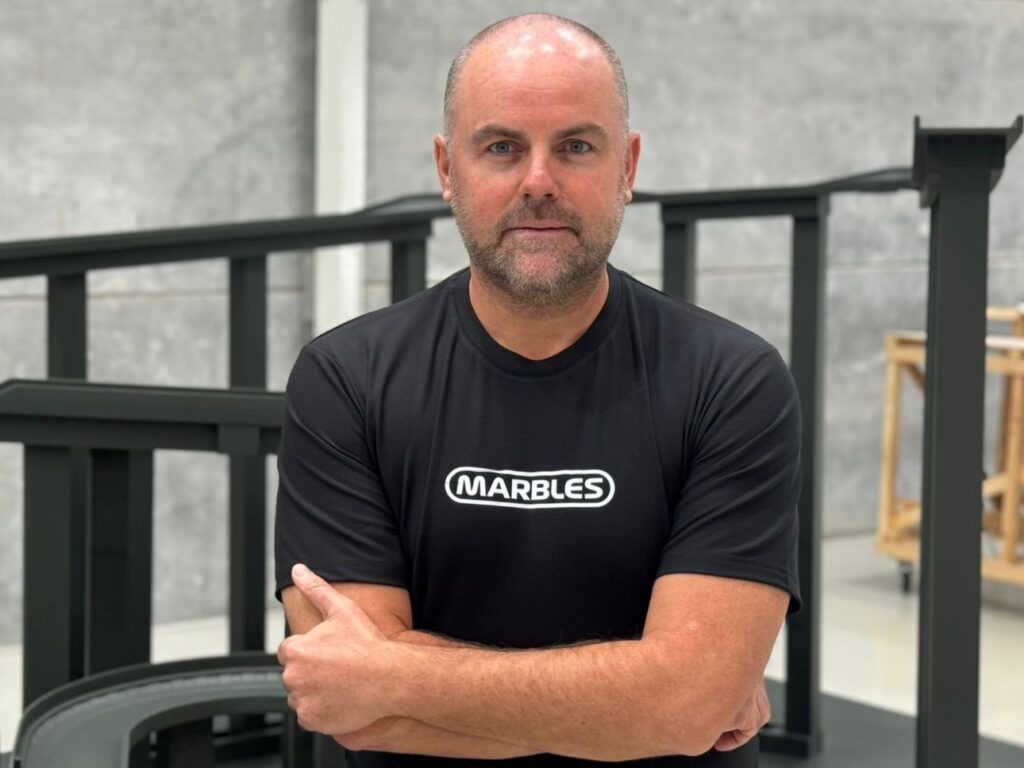155 is that rare star in iGaming: a genuine maverick in live game creation, taking big, creative risks required to disrupt the industry, writes Lauren Harrison.
Known for mobile-first, real-world games like “marbles.io”, “ducks.io”, and “stairpong.io”, the company is forging a bold new path steeped in originality and focused on leveraging cutting-edge social trends to deliver games that break the mould.
Founded in 2024 by serial entrepreneur Sam Jones, 155 has quickly developed a growing reputation for creating games not just built to compete, but forged to flip the narrative through focusing on “living communities” that appeal to a newer generation of players, raised on short-form, interactive content.
And Sam’s background makes him the perfect fit to lead the charge into the future of real-money game design.
With previous ventures spanning sectors as varied as fintech, fantasy sports and gaming–including one social commerce platform co-founded with music legend Snoop Dogg–, he’s no stranger to high-risk innovation.
Today, in a first, Sam joins iGF’s Head of Content, Curtis Roach, to discuss where he believes digital gambling is going wrong and, most importantly, offer key solutions to how our industry can stay ahead of the game – and deliver the next generation of winning iGaming strategy.
Curtis began by asking:
Does the iGaming market offer enough content that’s relevant for the next generation of players? What risks does this pose for operators? And how can it be improved in the future?
“Honestly, the industry still does a poor job of bringing genuinely new formats and concepts to market.
“If you’ve walked the floor at ICE or any major iGaming trade show, you’ll know what I mean. There’s an overwhelming amount of slot and crash content, but very little that feels fresh or designed with the next generation of players in mind.
“A big part of the problem is that many companies feel safer copying proven formats rather than innovating.
“This might be commercially understandable in the short term. But in the long term, it’s a risk, especially for operators trying to stay relevant to a new wave of players raised on mobile, streaming, and fast, interactive content. If we don’t evolve the entertainment offering, we risk losing their attention altogether.
“At 155, we embrace this challenge. We know it’s not easy to launch a brand-new game format – especially something as unconventional as live duck racing or marble racing.
“These games require a significant amount of effort to build and explain. But that’s the space we want to own as first-movers. It takes graft, creative storytelling, and the right distribution partners to help players understand how to engage with something new.
“If we get it right, then we’re creating a whole new category. And we’ll be the ones being copied. And honestly, we’d take that as a compliment.
“Innovation carries risk, especially when you’re building live, physical tracks in real-world environments. But we’re comfortable with that risk because we’re building for the future.
How important will the social element be for iGaming in the future? What does it mean to be a truly social game, and how challenging is it to implement?
“We believe the social element will be absolutely essential.
“For too long, gambling has been treated as a solitary experience; singular experiences, often losing silently in front of screens or machines.
“Our mission with 155 is to flip that narrative. Our games are a shared experience. You can see other players in your race, where they’re from, how they’re betting and on what. We’re creating a living community.
“Streaming takes social up a level. Players can watch races live, tune in to celebrity commentators, or pull together a group of friends to watch and cheer on the bettor.
“It’s designed to connect people, whether that’s through shared excitement, competition, or conversation.
“True social gaming isn’t just a chat forum. It’s about designing mechanics that reward regular players, encourage friend referrals, and create moments people want to share.
“We’ve had fun implementing it, and our goal is to create a 24/7 real-time gaming platform. But for us, social is a core part of the experience.”
155.io has just launched the innovative, new duck racing game. What inspired the game, and what features does it include that will help operators reach a new and younger audience?
“The inspiration behind ducks.io came from the universal appeal of the little plastic ducks. They resonate across genders, cultures and languages, giving a globally addressable market.
“And they’re instantly recognisable and popular across the world–in Asia, America, and Europe–with people collecting them in all styles and characters, from Einstein to Trump to Liverpool FC.
“Real-world duck races were also a significant influence. They’ve remained a community tradition for decades. Whether in villages or cities, people have been racing plastic ducks down rivers to raise money for charity.
“It’s fun, inclusive, and rooted in real-life entertainment. So we thought, why not bring that concept to the iGaming world? Ducks.io lets players pick their own duck and watch races develop live, either solo or with friends.
“The game is fast-paced, mobile-first, and designed with a strong social layer–including live commentary, influencer interaction, and community features–, making it a natural fit for younger players who are used to streaming, instant engagement, and shared experiences.
“It’s real-world fun, reimagined for the next generation of online entertainment.”
Do you think this marks the start of a new trend in iGaming? How will the introduction of games like these change the shape of the industry over the next three to five years?
“Without a doubt, we’re at the beginning of a major shift in iGaming.
“If you look at how content is created and consumed today on Instagram and TikTok, it’s unrecognisable from 10-years-ago. No one is sharing news; they’re creating content to go viral.
“It’s all about creativity, personality, and personal branding. And that mindset is already influencing mainstream industries. We’ve seen short-form, TikTok-style video segue into advertising, and iGaming is next.
“That means the rise of mobile-first formats: Short, engaging, video, live content, and games you can bet on in real-time. That’s exactly where 155.io wants to be, and own.
“A quick look at social media and you’ll soon find content on coin tosses, marble races, and random challenges. This content grabs attention, and attention is the most valuable currency right now. The challenge is that it’s hard to execute well, but it’s something we’ve mastered.
“The industry is still largely focused on classics like Blackjack, Roulette, and Baccarat. But we firmly believe that as a new generation comes through, there’ll be growing demand for games that are not only bettable but social and immersive, something people can play, stream, enjoy with friends.
“That’s the creative movement we want to drive.
“Over the next three-to-five-years, we expect to see a new wave of content-driven, entertainment-first iGaming formats that reflect the way people engage with content.”
Editor’s Note:
Sam believes we are witnessing a major shift in iGaming, one influenced by new forms of content and styles of immersive entertainment, and where the most valuable currency has become attention.
In an industry still dominated by slots and table games, he makes the case that true innovation is too often avoided because it’s complicated. And risky.
But the truth remains: Games designed for new players need more than a simple re-skin.
And while communicating new concepts in a world where attention spans are shrinking is no easy task, 155 is taking on the challenge and owning the space.
Positioning themselves as first movers, leading iGaming into the future by building games that are, at heart, a social and shared experience, ones designed to connect players, 155 is delivering a new world standard of real-money games.



